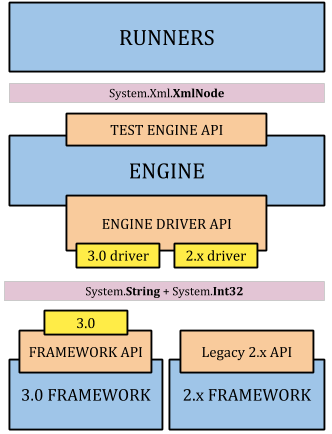Test Discovery And Execution
Warning
This is a draft. The contents may be out of date.
This spec summarizes the three levels of APIs provided by NUnit for discovering and running tests. Note that only one of them - the highest level - is supported for general usage. The others have very specific purposes and should only be used for those purposes.
The three APIs, from highest to lowest level, are:
- Test Engine API - for use by any program that needs to discover and execute tests.
- Engine Driver API - for use by framework drivers, intended to be loaded by the engine to enable communication with a particular framework.
- Framework API - only used by NUnit's own framework driver to communicate with the framework.

Test Engine API
The NUnit TestEngine is a separate component, new to NUnit 3.0, which knows how to discover and execute tests. It provides an API for both simple batch execution and more complex interaction as needed by typical Gui test runners. It also provides additional Engine services beyond what the framework provides.
This API is currently under development. See Test Engine API for more info.
Engine Driver API
The NUnit TestEngine uses drivers to communicate with test frameworks. Initially, the engine will come with a driver for NUnit 3.0, followed by an NUnit 2.x driver. It is possible to create a driver for running any sort of test framework, supporting any language at all. The driver API is what makes this possible.
The driver API is only intended to be implemented by drivers and is only used by the NUnit engine. This API is currently under development. See Engine Driver API for more info.
NUnit Framework API
This is a primitive API implemented by the nunit.framework and NUnitLite assemblies. The NUnitFrameworkDriver in the engine uses this API. The API is a bit complicated to use. Since it needs to support multiple versions of the framework, it uses well-known framework class names, which are constructed via reflection. All results are returned as raw XML.
This API is not intended for any use except by NUnit itself. See Framework API for more info.